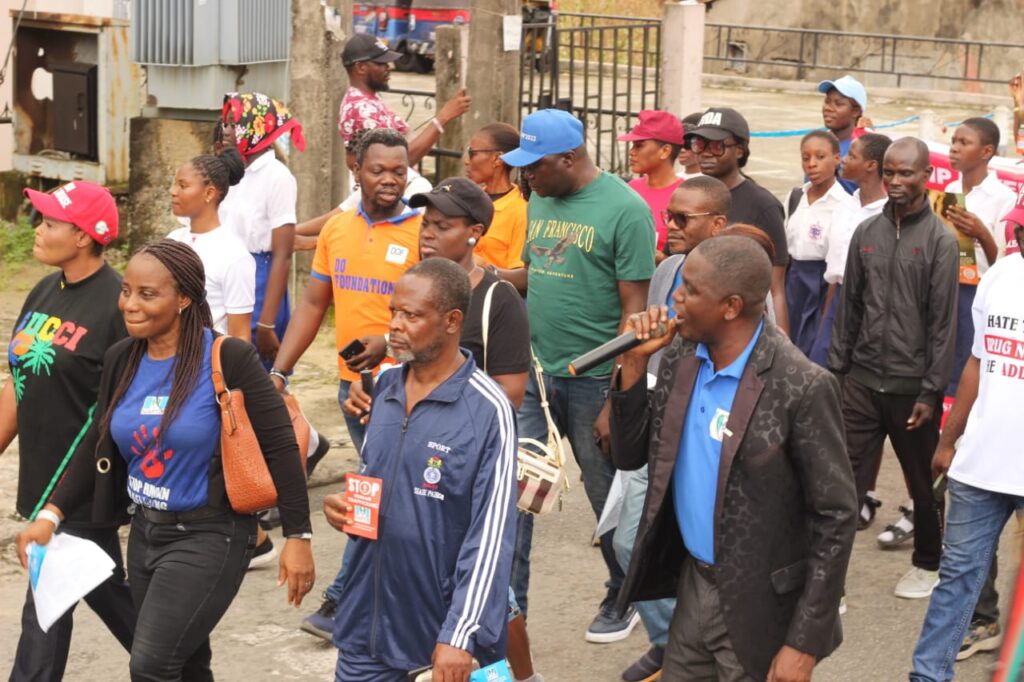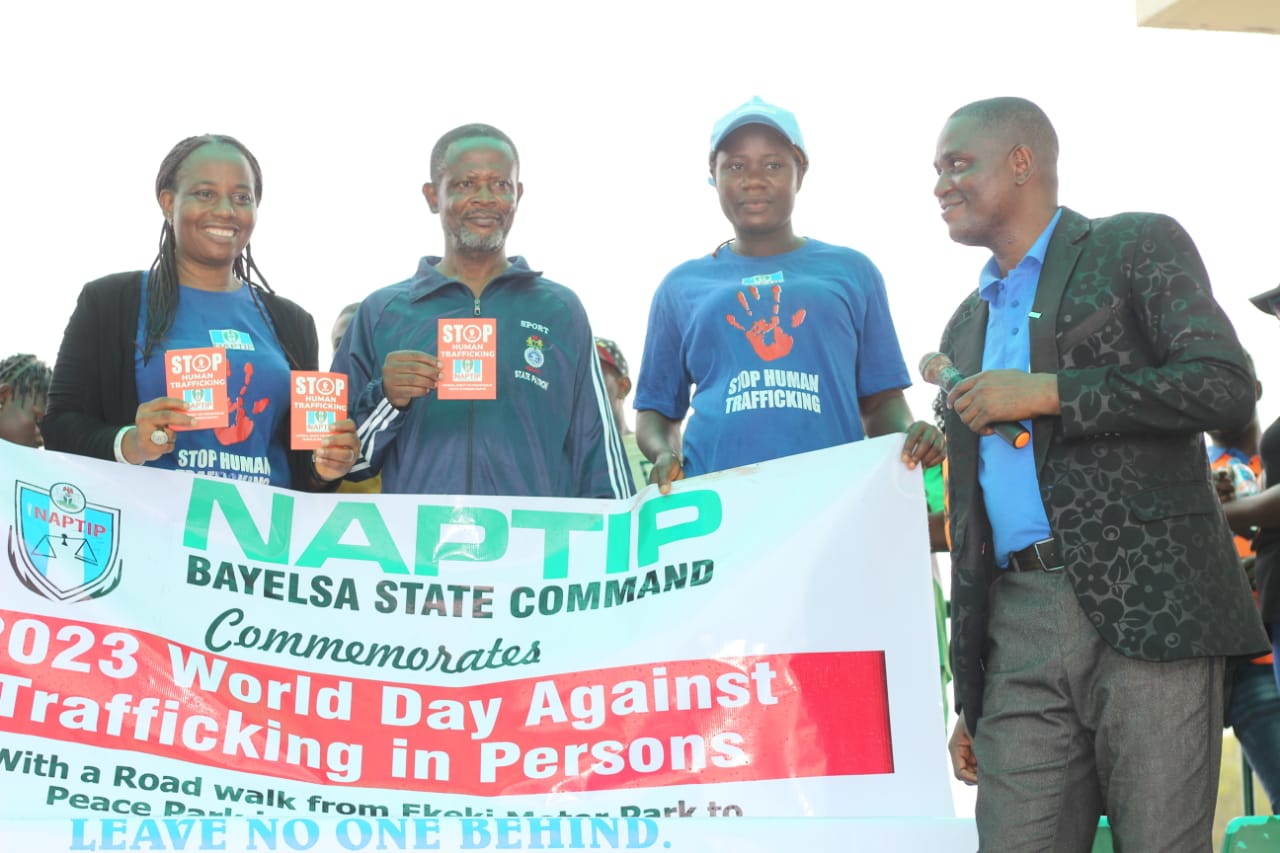The Senior Special Assistant (SSA) to Bayelsa State Governor on Tourism and facilitator of South-South Tourism Roundtable Dr. Piriye Kiyaramo has called for synergy between the National Agency for the Prohibition of Trafficking in Persons (NAPTIP) and the tourism and hospitality industry to train hotel staff on how to identify telltale signs on victims of human trafficking.
L-R, Bayelsa State Commander of NAPTIP, Mrs. Abieyuwa Ikhidero, the Senior Special Assistant to Governor Douye Diri on Tourism, Dr. Piriye Kiyaramo, Ovie Williams, Administration Staff of NAPTIP and the
Head of Public Enlightenment Unit of NAPTIP, Bayelsa State Command, Mr. Sambo Wariebi.
Dr. Kiyaramo stressed the urgent need to create workplace policies and procedures on how to manage cases of human trafficking in addition to training all staff on what human trafficking is, what warning signs to look out for, and how to safely intervene, informing that sex trafficking has become a global underground economy worth $150bn annual turnover, displacing over several millions of individuals across the globe.
Speaking with newsmen shortly after participating in a road work against the menace of human trafficking as part of activities to commemorate of the 2023 United Nations World Day against Trafficking in Persons, with the theme: ‘Reach every victim of trafficking, leave no one behind’, organised by Bayelsa State Command of NAPTIP to raise awareness on the plight of human trafficking victims, in Yenagoa, at the weekend, Dr. Kiyaramo noted that trafficking of adults and children for commercial and sexual purposes has become a global problem that constitutes serious health threats to citizens.

He reiterated that promoting and protecting rights of human trafficking victims was a moral and ethical responsibility of the tourism and hospitality industry with a view to counteracting sex trafficking and sex tourism, lamenting that the tourism industry has seemingly become either directly or indirectly associated with sex trafficking, citing hotel accommodations and direct consumption of sexual services that occur within the sector.
According to the governor’s aide, human trafficking has been an issue which tourism and hospitality training institutions have failed to fully engage with, in considering the human costs of trafficking from a gender perspective, adding that ‘there is virtually no place in the world that is safe from trafficking in persons because in every three known victims of human trafficking crime is a child, with girls and women, accounting for about 70 per cent of overall victims worldwide.
“That being said, men are also targeted, in particular those from low socio-economic backgrounds and those who lack legal status abroad. The majority of trafficked individuals are female victims forced into sexual captivity with a third of children aged 18 and below. The high rates of disease, poverty, and unemployment, together with frequent wars and social crises in our society, also contribute to various forms of trafficking.
“Many victims are confined and exploited in hotels, motels, and Airbnb, as in “Air Bed and Breakfast,” a service that lets property owners rent out their spaces to travelers looking for a place to stay.
“Also, large-scale events often attract traffickers, hoping to capitalize on increased visitation. While labour trafficking victims may be forced to work at a range of tourism establishments, from janitorial services at a ski resort to a dishwasher at a restaurant (services rating to, or involved in the cleaning, repairing, and maintenance work done by a janitor), Dr. Kiyaramo explained.
In her address, Bayelsa State Commander of the National Agency for the Prohibition of Trafficking in Persons (NAPTIP), Abieyuwa Ikhidero, noted that the complexity of the crime of human trafficking warrants a multi disciplinary and coordinated approach that involves all sectors of the society.
She said NAPTIP was willing to go into partnership with government at local and state levels, including corporate establishments, the organised private sector, faith based organisations, religious/traditional institutions, law enforcement agencies and the general public to stop the unwholesome practice.
“NAPTIP can’t fight alone against the menace of human trafficking in the Bayelsa State. All hands must be on deck to win the war against human trafficking. If you see something, say something,” Commander Ikhidero said.
With the World Day against Trafficking in Persons, celebrated every 30 July, the global community is reminded of the plight of millions of victims that are suffering in the hands of their exploiters.
Sister agencies that participated in the road work, from Ekeki Park to the Peace Park, included, personnel from the Federal Road Safety Corps (FRSC), Nigeria Immigration Service (NIS) Representative of the Commandant of National Drug Law Enforcement Agency (NDLEA), Nigeria Security and Civil Defence Corps (NSCDC),
Federal and State Fire Services.
Other bodies are: Staff of the State Ministries of Women Affairs, Culture and Tourism, FIDA, Bayelsa State Chapter, Gender Response Initiative Team (GRITS), Medlye Ministry, Do Foundation, Nigeria Association of Women Journalists (NAWOJ), Nigeria Union of Journalists (NUJ), Radio Bayelsa, General Manager of the Peoples’ FM, Oxbow Lake, Chichi Umeseaka, People with Disabilities (PWDs), News Agency of Nigeria (NAN), students and teachers of St. Jude’s Model Girls Grammar School Amarata and Government Technical College Okaka.



